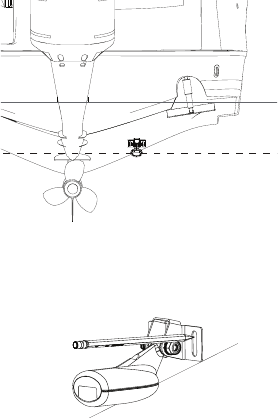
| 15
Display Installation | HDS Gen2 Touch Installation Manual
¼ Note: Boats with strakes or ribs on the hull can create large amounts
of turbulence at higher speeds. A good transducer location on these
types of boats is between the ribs closest to the engine.
¼ Note: If the transducer is not placed in a smooth ow of water,
interference caused by bubbles and turbulence may show on-
screen in the form of random lines or dots. The unit could also lose
bottom signal when the boat is on plane.
¼ Note: Trim tabs will vary in the amount of turbulence they create as
they are adjusted, stay clear of these.
Attaching the transducer
The transducer should be installed parallel with the transom’s
waterline, not the bottom of the boat (deadrise).
¼ Note: Ensure the entire bottom surface of the transducer hangs
at least couple of millimetres (1/16ths of an inch) lower than the
bottom of the hull.
Hold the transducer with bracket up to the transom of the boat
and trace the slotted screw hole locations (two on the 83/200 KHz
transducer, and four on the 50/200 KHz transducer). Mark drilling
points in the middle of each outline, to allow for transducer height
adjustment. Drill pilot holes to suit fasteners.
¼ Note: Check that there is nothing on the other side of the mounting
surface that may be damaged by drilling.
Attach transducer to transom, using supplied stainless steel
fasteners. Drill a 25mm (1”) hole above the waterline, large enough
to pass the plug through.


















